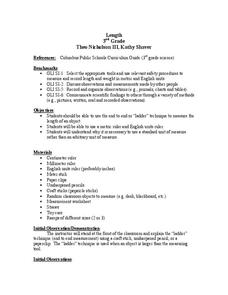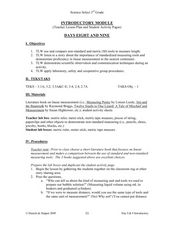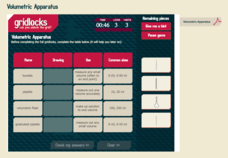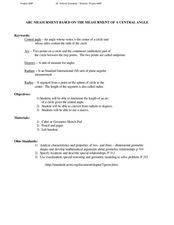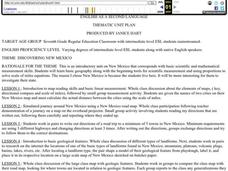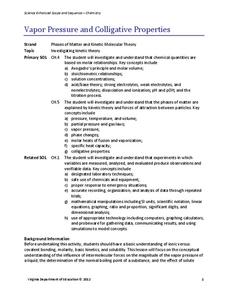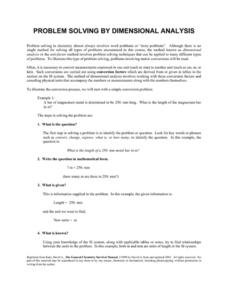Curated OER
Length
Third graders examine and explore a variety of ways to measure length. They discuss how to measure large objects using the end-to-end method, and in small groups measure the length of the room using the end-to-end method with a...
Curated OER
Introductory Module
Third graders examine the non-standard method of measurement and compare it to the metric system of measurement. In this introductory module instructional activity, 3rd graders discover the scientific observation. Students also develop...
Curated OER
Instruments and Measurement
Students circulate through stations to determine the proper instrument to make a certain type of measurement. They must make measurements of mass, volume, length, area, electrical current, temperature and force.
Curated OER
Measurement: Length, volume, and temperature
Young scholars determine the temperature of the water in a cup, measure the length of a piece of cardboard, and measure out an appropriate volume of water. This task assesses student's abilities to perform measurement and reporting skills.
Curated OER
Measurement: Using the balance
Students use a balance and gram cubes to measure several different objects. They then record their results on a data chart and answer questions about them.
Royal Society of Chemistry
Volumetric Apparatus
Can your class tell the difference between a burette and a pipette? Develop their lab apparatus knowledge using a series of puzzles. The online activity associates the name, image, and sizes of burettes, pipettes, volumetric flasks, and...
Curated OER
Estimation Task
Upper graders practice their estimation skills by observing different objects then making their best guess without using measuring instruments. Young scholars are asked to estimate mass, length, volume, and area.
Curated OER
Unit of Measurement
In this unit of measurement worksheet, middle schoolers identify the symbols for the metric units of measurement. They write the appropriate unit of measurement for eight statements and they solve three density problems.
Curated OER
Measurement of a Central Angle
Pupils calculate the measurement of a central angle. In this geometry lesson plan, students identify properties of circles. They use Cabri software to create and analyze graphs.
Curated OER
Determining the Density of a Liquid
Young scholars find the density of diet soda and regular soda. In this density lesson plan, students measure the mass of a graduated cylinder with 10 different volumes of each soda. They find the mass of the liquid alone and use the...
Curated OER
An Introduction to Sensors
Students research the International System (SI) of units of measurements. They make measurements using the metric system. They study key concepts used in building and use of sensors, how sensors work and their role in measuring...
Curated OER
Conversion of Measurement
Students practice converting measurements using System Internationale (SI). (The metric system is now called System Internationale.) In groups, students measure various objects in the room using the SI system and the standard unit of...
Curated OER
Measuring Temperature and the Production of CO2 in Yeast
Students use a model experiment to complete an experiment on yeast. In groups, they identify the independent and dependent variables and use the scientific method to complete the activity. They record their observations and discuss them...
Curated OER
Magnetic Units of Measurement
In this magnetic circuits worksheet, students answer 16 questions about magnetic flux, resistance, voltage, current, and reluctance.
Curated OER
Discovering New Mexico
Seventh graders discuss the elements of maps and using basic linear measurement. They calculate the distance between the cities and create a simulated journey around New Mexico using a road map. They write out the directions for their...
Royal Society of Chemistry
Born-Haber Cycle: NaCl
Max Born and Fritz Haber developed the Born-Haber cycle in 1916, which is used for measuring enthalpy that otherwise couldn't be measured. Young scientists solve four matching puzzles using their knowledge of the stages, standard...
Virginia Department of Education
Partial Pressure
At some point, everyone has been under pressure—even Dalton! Explore Dalton's law of partial pressures with young chemists as they measure the volume of air extracted from a sample compared to its original volume. Class members perform...
Virginia Department of Education
Vapor Pressure and Colligative Properties
Hate to vacuum, but enjoy using a vacuum pump? Explore a lesson plan that starts with a demonstration of boiling water at various temperatures by using a vacuum pump. Then scholars design their own experiments to measure vapor pressure...
Virginia Department of Education
Acid-Base Theory
Litmus paper, why so blue? A chemistry lesson includes a pre-lab activity, practice calculating pH, an experiment measuring the pH in acids and bases, a titration demonstration, and a titration experiment.
Virginia Department of Education
Thermochemistry: Heat and Chemical Changes
What makes particles attract? Here, learners engage in multiple activities that fully describe colligative properties and allow the ability to critically assess the importance of these properties in daily life. Young chemists conduct...
Curated OER
Observation Milk Fat Lesson
Turn your class loose to experiment with the different fat content in skim milk, whole milk, half and half, and heavy cream. This is a visually vibrant experiment, as learners drip food coloring on the surface of the products and measure...
Chymist
Problem Solving by Dimensional Analysis
Is your class in another dimension with regards to dimensional analysis? Give them some extra practice with a straightforward activity. Learners convert units by following concise step-wise examples, including setting up the problems....
Curated OER
Conversion Factors
In this conversion factor worksheet, students convert 15 problems within the SI system of measurement. They show their work and indicate the proper units.
Curated OER
Tools of the Trade
Third graders explore and identify the tools that can be used to measure length, mass/weight, and volume. They discuss how things are measured using different units, and observe the difference between the English and the Metric systems....


